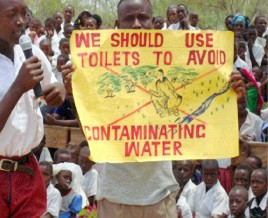
The Coca-Cola Company and USAID have created a unique partnership to address community water needs in developing countries. In conjunction with local USAID missions, Coca-Cola system partners, and the Global Environment & Technology Foundation, the Water and Development Alliance (WADA) contributes to improving the sustainability of watersheds, increasing access to water supply and sanitation services, and enhancing productive uses of water. With a combined investment of $28.1 million since 2005, WADA is impacting the lives of people in 22 countries throughout Africa, Asia, the Middle East, and Latin America.
Kenya's rural areas desperately need improved access to water, sanitation, and hygiene services. To address these challenges, WADA's Mombasa Kenya Project partners constructed water storage facilities and communal water points, installed 10 km of pipeline, and planted 36,000 trees around water sources to improve watershed management. WADA partners helped communities shift from burning trees to produce charcoal for income, to earning income by growing vegetables near reservoirs. Beneficiary communities were involved in the planning and implementation of WADA-supported activities.
Project partners also constructed 32 ventilated improved pit latrines and installed hand washing facilities in 35 Kenyan schools. They promoted improved hygiene practices in the project areas. In December 2010, WADA formally handed over project management to the community at an event in Chanzoi Village–one of the 20 villages that benefited from the project. An estimated 37,000 Kenyans have been positively affected by these and other project changes.
"I am happy that I can now easily draw water from this hand pump, which we can see is cleaner," said Mariam Milton Zuma, a project beneficiary. "We previously used to dip all our containers and also step into the water while drawing water. We have learnt that this practice was contributing to… diseases, especially for our children, who used to complain of stomach problems."
In South Africa, limited access to safe water presents a significant health challenge, especially for the poor and people suffering from HIV/AIDS. In the Eastern Cape, WADA is supporting the refurbishment of the Elliotdale water treatment works, extending 20 km of pipelines, and constructing communal standpipes to improve drinking water services to over 1,000 households.
WADA partner, the Mvula Trust, works with a water committee made up of representatives from beneficiary villages. This committee ensures that the community voice is heard in allocation and siting of tapstands and that local people benefit from employment opportunities. Mvula also improves hygiene awareness through interactive theatrical performances.
"Clean drinking water is not just a necessity, it is a right, and by working together we will ensure that at least 1,000 families get the clean and potable water they deserve," said Dr. Alberta J. Mayberry, U.S. Consul General in South Africa.
In discussing the WADA partnership, Dr. Sharon Murray, Water Resources Program Manager with the USAID Water Team, said, "The continued expansion of our alliance with Coca-Cola attests to the energy and force a development agency and a private sector partner can, and have, put forth to address our common concern about the global water crisis. Our efforts bring tangible benefits to communities in the developing world and we are excited that WADA has increasingly permeated the culture and operation of each organization."
A. Pruitt
For more information, visit:
http://www.thecoca-colacompany.com/citizenship/community_initiatives/USAID.html







Comment
Make a general inquiry or suggest an improvement.